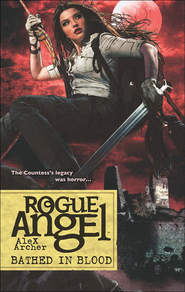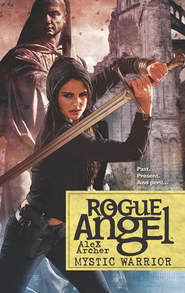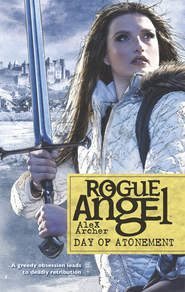По всем вопросам обращайтесь на: info@litportal.ru
(©) 2003-2025.
✖
Secret Of The Slaves
Автор
Год написания книги
2019
Настройки чтения
Размер шрифта
Высота строк
Поля
“I understand,” she said, unable to repress a little sigh of frustration. “Obviously it’s in an extremely fragile state to require such extreme preservation measures.”
“You don’t understand, Ms. Creed,” he said. “Everyone who handles this book dies. Horribly.”
She looked aside. A wall-sized window, waist high, opened into the cold room from the reading chamber. The book itself in its high-tech bell jar looked even more impressive closer up.
“I don’t believe in curses, Sir Iain.”
His laugh was short. “There’s nothing paranormal about it,” he said, “or not overtly so. The pages and binding are imbued with a hitherto unknown living organism that is not unlike slime molds. It attacks whoever touches it, both by means of airborne spores and by contact. The effect resembles a cross between flesh-eating bacteria and sarin gas. It isn’t pretty. And it is extremely fast acting. As well as untreatable by any known means.”
“Nice.” She sucked in a sharp breath. The air was cool, smelled vaguely of ozone. “How did you get it back here?”
“Carefully. Very carefully.”
She went to the workstation and sat in the chair. Reading was dead easy. A black wireless mouse controlled a cursor on the screen. She could point to icons around the perimeter of the image. When she ran the cursor over them, text tips popped up.
“Interesting,” she said, frowning slightly in concentration at the huge high-definition screen. “Are these the pages it’s currently open to?”
“Yes,” he said, “although you can page through it. The entire volume has been digitized.”
“I see. Well, it’s open to a very dramatic passage. Our author’s talking about what seems to be the end of his journey, of both the wonders and hazards he encountered—a colossal snake—had to be an anaconda. They’re one of the world’s largest. And, whoa, a golden onza. Hmm.”
“You can read that? That easily?”
“I specialize in archaic Romance languages, Sir Iain.”
“But the handwriting—it’s all just spider tracks to my eyes. Worse than my handwriting, and that’s saying a packet.”
She smiled. “As I guess I hinted earlier, this isn’t the first old Portuguese Jesuit diary I’ve looked at.”
“What’s a ‘golden onza ’?” he asked. “It seemed to strike you as significant.”
“An onza is a jaguar. A golden onza is a particularly impressive specimen. Larger than life, you might say. Legend imbues them, some of them anyway, with incredible intelligence and sometimes outright supernatural powers.”
“Indeed.”
“Okay. Apparently our priest was captured by Indians, blindfolded and taken to something called quilombo dos sonhos, ” Annja said as she continued reading.
She sat back. “ Dos sonhos translates as, ‘of dreams,’” she said. “But what’s a quilombo? ”
He pulled a chair over next to hers and sat, leaning slightly forward, with his elbows on his thighs. “Have you heard of the Maroons, then?”
She turned to face him. “If I recall correctly, that was a name for escaped New World slaves who fought guerrilla campaigns against recapture—sometime with pretty significant success. Toussaint-Louverture ran the French colonial overlords clean out of Haiti. Of course, I suspect they’d be called terrorists today.”
“These quilombos, I’m told, were settlements the Brazilian Maroons formed in the wilds, mostly along the coast,” he said. “Some eventually became republics powerful enough to stand off their erstwhile oppressors for centuries. A few actually maintained their independence until the Brazilian empire became the republic in 1889. Several are still around today as townships.”
He sat back and draped an arm over the back of his chair.
“The most famous of all was the Quilombo dos Palmares in northeastern Brazil. It held out against Dutch attacks, as well as Portuguese, until it was reduced by artillery in 1694.” He frowned. “Curious, really. My researchers inform me they also traded quite frequently with the Dutch and the English, for arms to use against their former masters.”
“Alliances were elastic in those days,” Annja said, drawn irresistibly back to the big screen. “As well as these days, and all other days I’ve ever read about. This quilombo the good Father describes—”
“Father Joaquim,” he said.
“The settlement was a sizable domain including rich farmland—which I thought was actually pretty rare in the Amazon Basin. It surrounded a fabulous city called Promessa—the Promise. There he describes himself as being treated as an honored guest by the inhabitants, whom he says are mostly intermarried Africans—those escaped slaves, I’m guessing, although they seem to have wandered pretty far from the Atlantic Ocean—and Amazonian Indians. He says the people are ‘well-versed in all arts and philosophy.’”
The rock star said nothing. His gaze was so intent she could feel it on her cheek like sunlight. But she was engrossed in the ancient manuscript.
She read through several more virtual pages before surfacing, more to draw a breath than to report. “He speaks of meeting savants whom he claims come from Asia. He might actually know what he was talking about. The Jesuits loved the Orient almost as much as they did South America. He could have spent time in Asia himself. Claims to have witnessed miracles from artificial light to almost instantaneous wound healing and treatment for all manner of disease. And here he writes, ‘Moreover the citizens know not aging, nor die, save by misadventure, or foul murder, or their own choice—wherein, sadly, they flout the Divine Will.’”
She gazed up at the screen a moment more. Then she sighed heavily.
“Okay,” she said, turning around to face her host again. This time there was an edge in her voice as chilly as the air in the room. “So this is a treasure hunt, right?”
The rough-hewed face split in a smile that had thrilled tens of millions of concertgoers—not to mention scores of CEOs and world rulers whom he addressed in his self-assumed capacity of global humanitarian activist.
“Imagine a world,” he said in a low, compelling voice, “in which there’s no disease, no suffering. No death.
“That would be a treasure worth hunting, wouldn’t you say, Ms. Creed?”
3
“With all respect,” Annja said, sipping green tea in a commissary appointed like a five-star restaurant, with dark oak paneling, bronze rails and ferns in place of the more traditional scuffed Formica counters and coffee machines, “Fountain-of-youth yarns have abounded in the Americas since, roughly, forever. As do fanciful accounts from the age of exploration. For that matter, the Jesuits have been known to bend the truth for their own purposes.”
Ignoring his chai latte, Moran nodded encouragingly. “That’s one of the reasons I contacted you,” he said. “You obviously believe in reason, in evidence. You are also willing to keep an open mind.”
“I did wonder,” she said. “I’m not the most famous TV archaeologist on television by a long shot.”
She smiled a bit lopsidedly. “Then again, if it was boobs you were after, you’d have called Kristie Chatham.”
“If you’ll forgive a momentary lapse in political correctness, Ms. Creed,” he said in that voice that had thrilled hundreds of millions, “you’re a beautiful woman. At the same time I’m sure you appreciate a man in my position seldom lacks for attractive female companionship, should that be his intent. For my part I’ve tried to put my wild past behind me. So I also hope you’ll understand that your striking appearance had nothing to do with my interest in engaging your services.”
She set down her cup. Her cheeks felt hot. “Now you’re flattering me.”
“Not a bit of it.”
“Well, after a speech that gallant, the least you could do is call me Annja.”
“Done. If you’ll consent to call me Iain,” he said.
“It’s a deal.” She sat back in her chair, picked up her cup and regarded him through a curl of steam rising into the cool air.
“You don’t strike me as the sort to fall for every goofy New Age notion to float past you in a cloud of pot smoke. I presume you have evidence more compelling than a wild diary, even if its pages are protected by a killer mystery fungus. Impress me.”
“I’ll do my best—Annja. In the favelas —the brutal slums—of northeastern Brazil they still speak of the quilombo dos sonhos. Legends still speak, also, of a magical city called Promise, where no one ever dies.”
“Such legends aren’t exactly uncommon worldwide, despite the inroads of science,” Annja said.
“So I thought. Until a hardheaded German business associate of mine, an aggressive atheist and skeptic, began experiencing remarkable dreams. Of a beautiful city, hidden deep in Amazon rain forest, filled with beautiful, ageless people who combined indigenous lore, Asian wisdom and Western science to create a cultural and technological paradise. In these dreams he got flashes of psychic phenomena, of cars that fly without wings or even visible engines.











